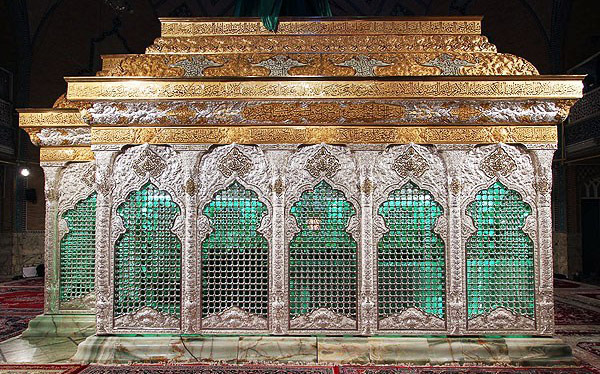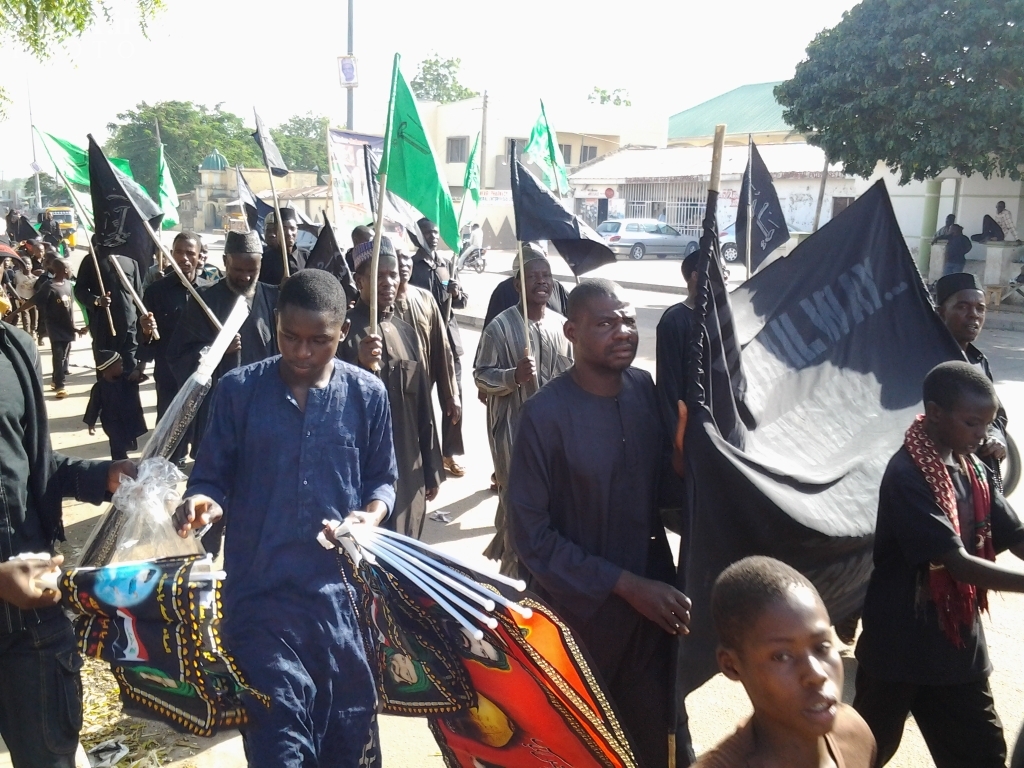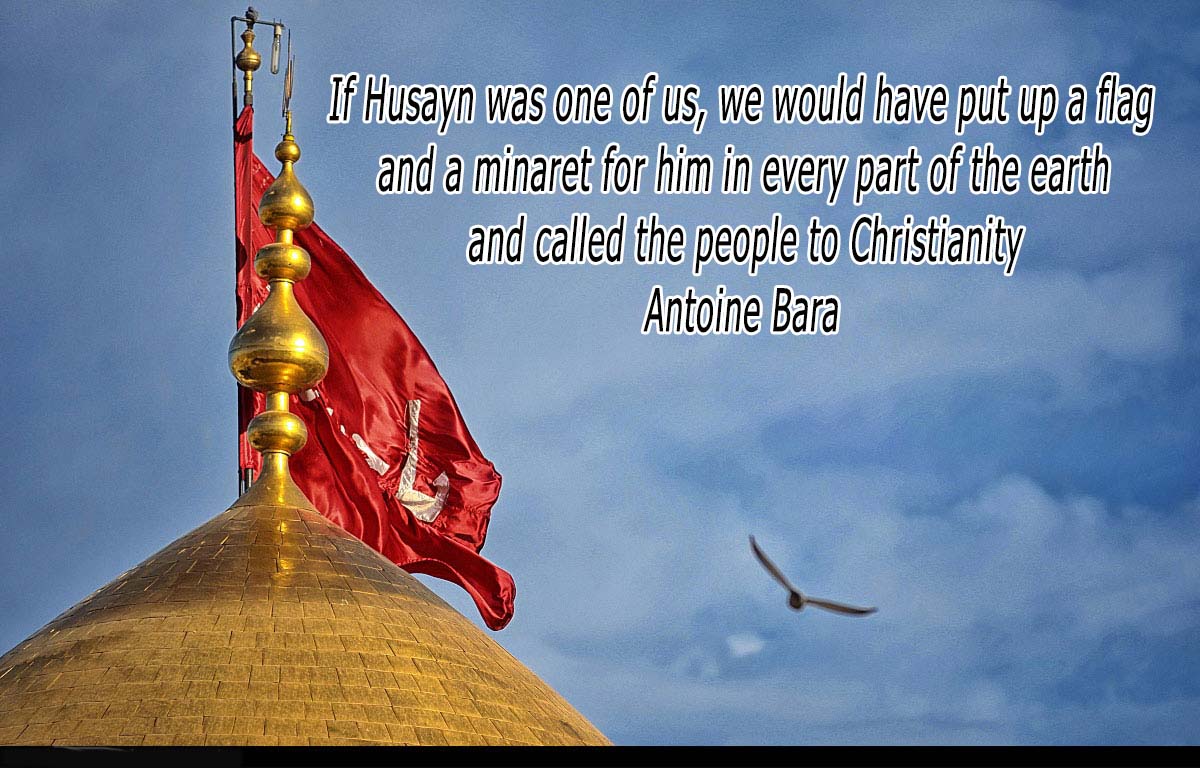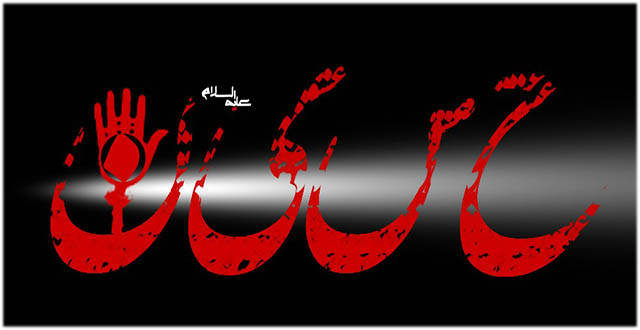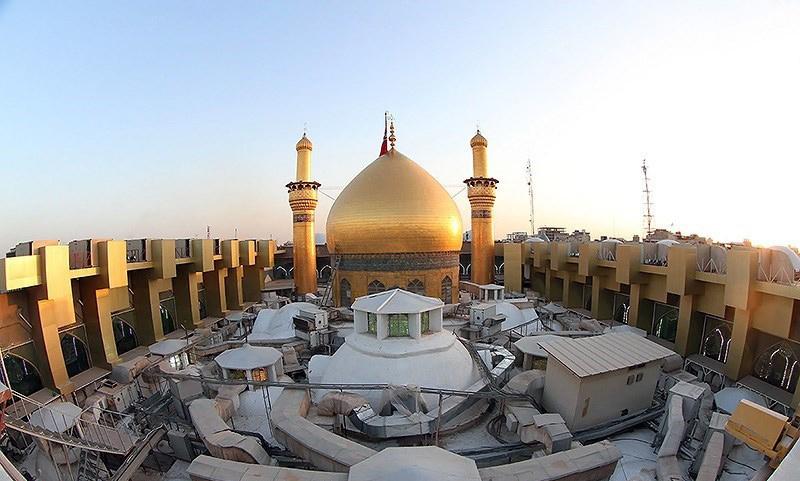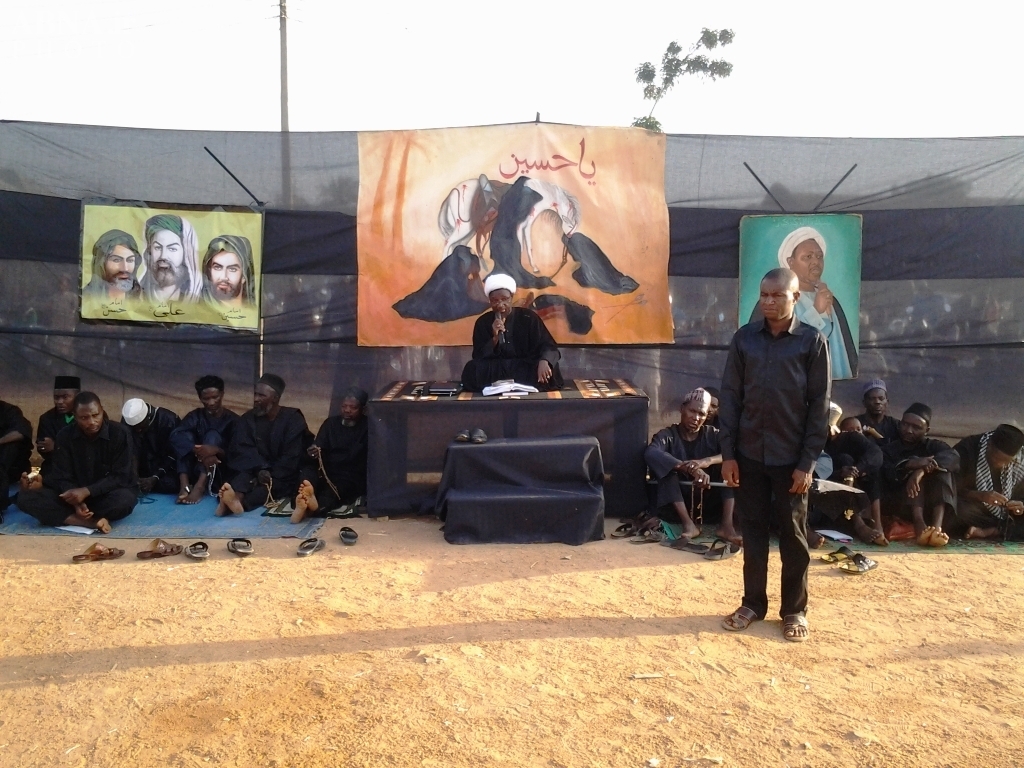Ali Asghar – the youngest martyr of Karbala
Abdullah Ali al-Asghar ibn Husayn (Tenth of Rajab, 60 AH – Tenth of Muharram, 61 AH) was the youngest child of Husayn ibn Ali and Rubab (the daughter of the chief of the Kinda Imra al-Qays tribe). Rubaab had two children, Sakina and Ali Asghar. She and her two children accompanied Imaam to Karbala. The fact that Imaam took with him a newly born baby further demonstrates the that his intention was never to engage in any armed rebellion. At Karbala Asghar was only six months old. He is honored by Muslims as the youngest martyr of the Battle of Karbala.
When most of Husain Ibn-Ali’s companions had sacrificed their lives for him, there was a cry heard. It was Husain, who was calling for anyone to help him. He reminded his enemies that he was the Grandson of the Prophet Muhammed [sm]. The same Muhammed [sm], who used to tell the people how much he loved Husain and his brother Hassan. According to traditions, once when he was preaching in the Mosque of Medina, and when Husain entered, he had tripped and fell because of the length of his thoub. The Prophet [sm] of God thus, left his preaching and ran to Husain, kissed him and brought him along and showed the people how much love he had.
Ali Asgher, fell from the cradle hearing the cry of his father Husain. Husain Ibn-Ali was called, and when he came, he saw the thirst that was gradually killing Ali Asgher. Therefore, he asked permission of his wife who was the mother of Ali-Asgher to take him to the battle field and ask his enemies for water.
Imaam walked into Bibi Rubaab’s tent. “Rubaab,” he said, “I will take him to Yazeed’s army. Surely they can not possibly deny this little infant a few drops of water?” Rubaab changed Ali Asghar’s clothes. She even tied a small turban on his head. Like any other mother she wanted her son to look at his best in front of strangers. Imaam Hussain took the child and covered him with a cloth to protect him from the scorching sun.
He brought the child into the battlefield. The enemy soldiers assumed that Imam Husain (a.s) was holding the Qur’an in his hand as a prelude to surrender. When Imam Husain (a.s) lifted the cloth, the soldiers gasped with surprise to see an infant. The infant smiled as if taunting the enemy in the face of adversity.
Walking up to Yazeed’s soldiers Imaam Hussain said,
“”O People! If, in your opinion, Hussain is guilty of any sin or crime, this innocent babe has done nothing to hurt any one of you. It does not even speak, and has not even uttered anything against you or your Amir at Damascus. He is dying of thirst. He had neither milk nor water for the last three days. Would you quench his thirst by a few drops of water? If you suspect that I demand water for myself in the name of the babe, then I will leave it here, if you want, and go easy and you may return it with his thirst quenched.”
Several enemy soldiers were moved by the sight and a murmur of sympathy was heard. Umar ibn Sa’d realized the seriousness of the situation and said, “Beware my soldiers! Do not be beguiled by al-Husain’s word. He is only tricking you into getting some water for himself. Even if al-Husain gets only a sip, it will reinvigorate him and several of us will lose lives.”
Imam Husain (a.s) replied,
“I only seek water for the infant, whose condition and agony is before you. Since you fear that I may myself drink the water, I am placing this infant on the ground so that you may yourselves take the child and quench his thirst.”
It is important to note that Imam Husain’s request of help was not because he expected to survive, but because he wanted to show that those surrounding him were stonehearted and cruel and that there was none, at that time, who was ready to help the lone, innocent person against the hordes who had gathered in support of oppression and tyranny.
He put the child on the sands of Kerbala and moved a couple of steps back.You can imagine how hot the desert sand was. Asghar lay there not even wincing. He turned towards the enemy and stared at them. A murmur arose among the soldiers but no one came forward to give water to the baby. Imaam took Asghar in his arms and in a clear voice said, “Asghar, my son, show them how thirsty you are!” Asghar turned his head towards the soldiers. He smiled sweetly. Opened his mouth. Brought out his dry tongue and moved it over his lips. The ultimate sword had been unsheathed! The soldiers were so moved by this that they could be heard sobbing. Still, they were very afraid of Yazeed and none dared come forward to give water to Ali Asghar.
This eloquent gesture of pure faith did not go unnoticed by Umar bin Sa’d who considered it to be much more powerful than all the eloquent sermons of Imam Husain (a.s) and all the martyrs. He therefore ordered Harmala to interrupt Imam Husain’s words.
The cruel Shimr said, “Beware soldiers! Al-Husain is only playing on your sentiments. Do not forget that the emir ibn Ziyad’s order is that not a drop of water should reach al-Husain or his family. Any disobedience of his order will invite immediate punishment.”
It seemed that Asghar was emerging victorious in this confrontation against the might of Yazid. He looked at Hurmala, a famous archer, and said, “Silence Hussain!” Then a terrible thing happened. Hurmala lifted his bow. Aimed an arrow at the child.
The arrow flew across the hot desert. There was a hissing sound. Asghar smiled. He lifted his head and arched his neck!! No civilized mind can even imagine what happened next. The hissing sound stopped and Asghar lay still on his father’s arms. Imaam Hussain looked down at Asghar’s neck, he saw the arrow, he saw the neck, he saw the smile and then he could see no more!!! Our Imaam began to feel faint. For a moment everything went dark. He could not see! There was a total silence over Karbala, broken only by the sound of the gentle waves of Furaat. Even the enemy appeared stunned. Slowly Hussain turned round and now looked at the baby in his arms. The arrow slit the throat of the six-month child and pinned him to Imam Husain’s ribs and arms. There was no way Imaam Hussain could dislodge the arrow. Imam Husain (a.s) collected in his palm the dripping blood from the child’s throat, looked towards the sky and then downwards towards the earth, and finally applied it to his own face. He was seen muttering something.
Several years later in a gathering, Imam Zainul Aabidin (a.s) was asked why Imam Husain (a.s) had applied the infant’s blood to his face and what was he muttering then. He replied, “My father was saying:‘Before God, I swear that these wretched people are cruel even to an infant. If I throw the blood of this innocent martyr toward the sky, no rain will ever fall anywhere on the earth, and if I throw it on the earth, it will become parched and unproductive forever. Therefore, I am applying it to my face so that I may complain to my Creator about the cruelty of these people.
His two arms were supporting the still child. He looked at the sky, and prayed “Ya Allah, give me courage in this most difficult moment of my life. No Prophet ever was subjected to a test as severe as this.” It is said that the Imaam was so shaken up by what had happened to the infant child, that all of a sudden his beard went all grey and he looked an old man. With his teeth he pulled his abaa over Asghar to shield the body from the scorching sun. Then he took a few deep breaths, and began to walk towards his camp. As he got near he saw Rubaab standing at the entrance to her tent. He saw the anxiety, the hope, the fear and the restlessness in her eyes. Our Imaam seemed to lose all strength. He could not walk forward towards Bibi Rubaab. He did not know how to take this child of his back to his mother, who will never again smile..
He took seven steps back saying “INNA LILLA-HI WA INNA ILAY-HI RAJEEOON”. He stopped and thought that he must take the child to his mother. He again took seven steps forwards saying “INNA LILLA-HI WA INNA ILAY-HI RAJEEOON”. Once again his eyes met with those of Bibi Rubaab’s.
Again our Imaam seemed to lose his courage and walked backwards repeating “INNA LILLA-HI WA INNA ILAY-HI RAJEEOON”. Imaam Hussain did this seven times. Forward and backward. All the time Bibi Rubaab’s eyes remained transfixed on the child. Each time Imaam reciting “INNA LILLA-HI WA INNA ILAY-HI RAJEEOON”. Finally, somehow, he got the arrow dislodged. He now took the dead infant to Bibi Rubaab.
Rubab looked at her husband’s face covered in blood and cried out “What have they done to my son, did they even give him a drop of water before they killed him?” Imam Husain (AS) said “I pleaded with them to give him water, but instead they drenched him with blood.” Rubab said “Please bury Ali Asgher with your own hands.” Hence he sat down to bury his baby son in the burning sand of the desert, by digging a grave using sword. After that he looked up and said. “O Almighty God bear witness that I have done my duty to the last.”
When Husain was beheaded and murdered, Ibn-Zyad announced that anyone who could bring the sever heads of all the companions of Hussein, would be rewarded. Eventually, all of Hussein’s companions’ severe heads were brought. Ibn Zyad questioned the head of the six-month old child Hurmala had killed. One of the people of Yazid’s Army explained that he saw Hussein Ibn Ali burrying his son.
Therefore, Ibn Zyad demanded that his army should go around the camp of Hussein and stabbing the ground with their swords and spears until they find the grave.
As a result, one of the soldiers found the body and beheaded Ali-Asgher’s head from his body. His severe head, along with all the companions’ heads was raised on spears. The ladies of Hussein who were taken prisoners were constantly reminded of their loved ones especially the wife of Hussein, Ruqayya.
At six months of age, Ali Asghar was killed by an arrow to his neck from Yazid’s army on the 10th of October 680, 10 Muharram 61 AH, which is known as Ashura. Does not even this one single sacrifice suffice to touch every human heart? Can we not call this one sacrifice alone greater than the sacrifice offered by Abraham? God alone knows the degree of the patience and the fortitude which He had endowed in the Imam Husain (AS) to bear the series of such unbearable calamities.
Keep prayers to Allah for hastening the reappearance, hence it is your victory.
We pray to Allah (SWT) to keep us firm on His path, and to always protect us from negligence in discharging our duties towards Him. Ameen
O Allah! Hasten the reappearance of our master Imam-e-Zamaana (AS) and enlist us among his helpers and soldiers! Ameen
/129

